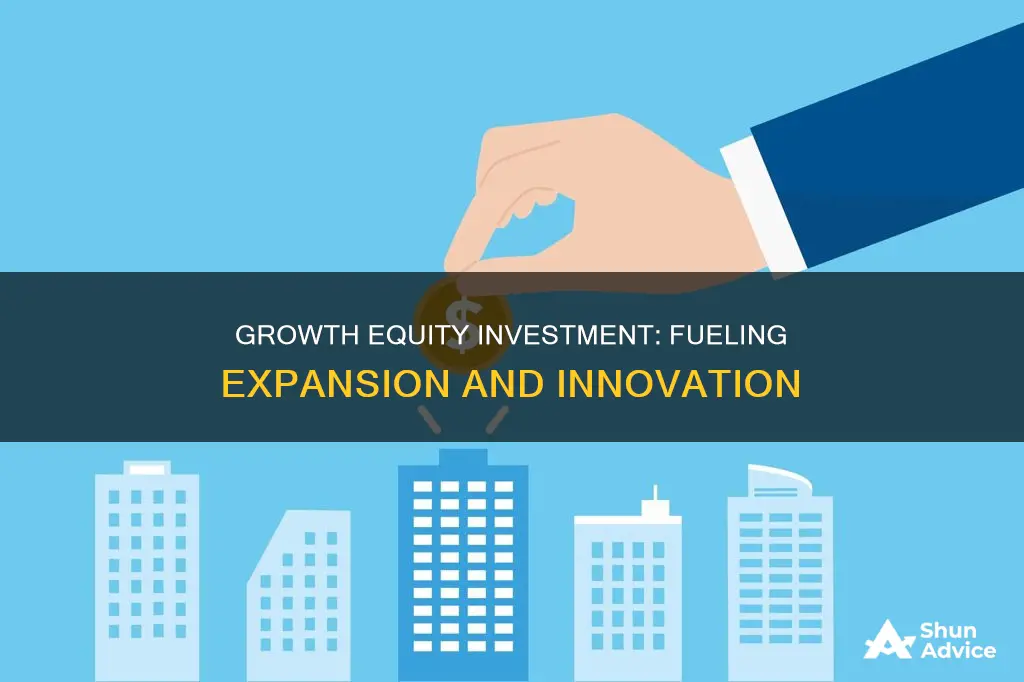
Growth equity is an investment strategy that focuses on acquiring minority stakes in mature companies that are experiencing rapid growth and have proven business models. These companies are typically in the late stage of their development, with strong revenue growth and established products or services. Growth equity firms provide capital to fuel further expansion, enter new markets, and boost revenues and profitability. The goal is to identify high-growth markets and invest in leading companies within those markets. This strategy prioritises future growth and expansion over short-term profits and often involves investing in tech-enabled products and services. While similar to venture capital, growth equity deals generally have a shorter holding period and are considered to have moderate risk.
| Characteristics | Values |
|---|---|
| Investment type | Opportunity in relatively mature companies that are going through a transformational event in their life cycle |
| Investment target | Companies with high growth and significant upside potential |
| Investment stage | Late-stage companies |
| Investment objective | Funding for continued expansion |
| Investment structure | Minority stakes |
| Investment focus | Long-term growth and expansion potential |
| Investment returns | Primarily through growth |
| Investment risk | Moderate risk |
| Investment period | Lower holding period compared to venture capital investments |
| Investment sources | Private equity firms, late-stage venture capitalists, investment funds |
| Investment advantages | Less influence over strategic and operational direction, more flexibility in the face of cyclical headwinds |
| Investment disadvantages | Less control over the company, need to build trust with management |
What You'll Learn
- Growth equity is a type of investment in mature companies with high growth potential
- It is a strategy to acquire minority stakes in late-stage companies
- Growth equity firms work with companies to boost growth and increase value
- It is a private investment strategy with a unique risk-return profile
- Growth equity investors benefit from high growth potential and moderate risk

Growth equity is a type of investment in mature companies with high growth potential
Growth equity investors typically look for companies that have already proven their business models and demonstrated strong product-market fit. These companies are usually in the high-growth phase and need funding to support their expansion plans. They are often privately-held, founder-owned or managed, and have strong revenue growth and business momentum.
Growth equity firms will invest to accelerate this growth, with a focus on long-term growth and expansion potential rather than short-term profits. They will also usually take a minority stake in the company, and the investment will generally be for a shorter period than venture capital investments (3-7 years on average, compared to 5-10 years).
Growth equity is considered to have a moderate risk profile. The companies targeted generally operate in established and mature markets with commercially viable products, and the primary source of returns is the company's ability to scale its operations, resulting in significant revenue and profitability growth.
Growth equity has evolved into a distinct asset class, offering a similar return profile to leveraged buyouts but without the use of debt, and with less dispersion among company returns and a lower risk of loss compared to venture capital.
Equity Investment Impacts: Understanding Balance Sheet Changes
You may want to see also

It is a strategy to acquire minority stakes in late-stage companies
Growth equity is an investment strategy that focuses on acquiring minority stakes in late-stage companies, typically those with high growth potential and a proven track record of success. These companies often have established business models, a viable product or service, and positive revenue growth. The goal of growth equity investors is to identify companies with strong upside potential and provide them with the capital needed to expand their operations, enter new markets, or make strategic acquisitions. This strategy is often referred to as "growth capital" or "expansion capital".
When making growth equity investments, investors usually acquire less than 50% ownership in the target company, allowing the founders and management team to retain control. This approach differs from traditional private equity or leveraged buyout strategies, where investors typically seek controlling stakes. Growth equity investors recognise that the companies they target have already demonstrated their potential and may only need additional capital to fuel their growth plans.
The companies that attract growth equity investment typically have strong revenue growth and business momentum. They have often reached a stage where they are looking to scale up their operations, expand into new markets, or enhance their product offerings. By investing in these companies, growth equity firms can benefit from the high growth potential while assuming moderate levels of risk.
It is important to note that growth equity firms do not always take an active role in the strategic and operational decision-making of the portfolio company. However, they can add value by providing operational resources, industry expertise, and strategic guidance to support the company's growth initiatives.
Growth equity investments are usually made in companies with low leverage or no debt. The investment horizon for growth equity is typically shorter than that of venture capital, reflecting the more mature nature of the target companies. Growth equity investors also tend to have more protective provisions and approval rights due to their minority position.
Overall, growth equity is a strategy that targets late-stage companies with high growth potential, providing them with the capital needed to fuel their expansion plans while allowing the existing management team to retain control and continue driving the company's success.
Savings and Investments: Economy's Growth Engine
You may want to see also

Growth equity firms work with companies to boost growth and increase value
Firstly, they can help with operational improvements, making business operations more efficient and scalable. This could include improving technology systems to enhance products and customer service, and helping companies to restructure and optimise their workforce.
Secondly, growth equity firms can offer strategic guidance. This could include advising on market expansion and potential mergers or acquisitions, as well as helping companies to establish a niche and continue their top-line growth.
Thirdly, growth equity firms can strengthen the team by hiring key executives or improving the skills of current management.
Growth equity firms also have a role in planning an effective exit strategy, such as an initial public offering (IPO), to ensure the highest possible returns.
Overall, growth equity firms prioritise long-term growth and expansion potential, rather than short-term profits, with the ultimate goal of helping companies achieve sustainable growth.
Strategizing Dividend Investment: Balancing Your Portfolio
You may want to see also

It is a private investment strategy with a unique risk-return profile
Growth equity is a private investment strategy that occupies the middle ground between venture capital and traditional leveraged buyout strategies. It has evolved to become more than just an intermediate private investing approach, with a unique risk-return profile. This strategy is appealing for a well-diversified portfolio as it is driven by accelerated operational improvements, revenue growth, low leverage, and downside protection.
Growth equity managers pursue companies that are at a more mature development stage than venture capital fund targets, but not as mature as those targeted by leveraged buyouts. These companies are well-run leaders in their industry or subsector, with proven business models, established products, growing customer bases, and often, a focus on technology.
Growth equity funds seek to invest in companies with significant and rapid revenue growth, usually exceeding a 10% run rate and frequently beyond 20%. This minimises the business risks often associated with venture capital investing, which can be based on speculative assumptions about the addressable market for a product. In contrast, growth equity investments are typically underwritten based on a clear business plan, with visibility on the next level of growth, defined profitability milestones, and quantifiable funding needs.
Growth equity investments are generally considered to have a moderate risk profile. They are often placed in a more senior position than common equity and come with negotiated negative control provisions and approval rights to mitigate the risks of owning a minority position.
The success of growth equity strategies is evident in the performance of companies like Shopify. In 2010, Bessemer Venture Partners made a significant investment in Shopify, a small but promising e-commerce platform. This investment helped Shopify improve its technology and expand its market presence, leading to a successful IPO in 2015 and a market capitalization of over $170 billion by 2021.
In summary, growth equity is a distinct private investment strategy with a unique risk-return profile, targeting companies with strong organic growth and minimal use of leverage.
Becoming an Investment Manager: Strategies for Success
You may want to see also

Growth equity investors benefit from high growth potential and moderate risk
Growth equity is an investment strategy that focuses on acquiring minority stakes in mature companies that are experiencing rapid growth and have proven the viability of their business model. These companies are often in the late stage of their development, with established products, customer traction, and positive cash flow or profitability.
Growth equity investors aim to benefit from the high growth potential of these companies while assuming moderate risks. The following factors contribute to the attractive risk-return profile of growth equity investments:
High Growth Potential
Growth equity targets companies with strong revenue growth and a proven track record of success. These companies typically have:
- A validated value proposition and clear target market
- A proven business model with established products and services
- Strong revenue growth, often exceeding 10% and reaching 20% or higher
- Positive cash flow or near-term profitability
- Strong product-market fit and customer traction
- Efficient and scalable operations
- Repeatable and scalable customer acquisition strategies
- Low debt or no leverage
Moderate Risk
The moderate risk nature of growth equity investments is primarily due to the maturity and stability of the target companies. These companies have:
- Proven business models and viable products, reducing market and product risks
- Established operations and customer bases, minimizing execution risk
- Strong financial health and positive cash flow, reducing the likelihood of failure
- Low debt or no leverage, reducing financial risk
- Downside protection through negotiated negative control provisions and approval rights for investors
By investing in companies with strong fundamentals and growth prospects, growth equity investors can benefit from the high growth potential while maintaining a moderate risk profile. The combination of high growth and moderate risk makes growth equity an appealing addition to diversified investment portfolios.
The Future of Investment Management: 2030 Vision
You may want to see also
Frequently asked questions
Growth equity investment is an investment strategy that involves acquiring minority stakes in privately-held companies that are experiencing rapid growth and have proven business models. These companies are typically in the late stages of development and are looking to expand their operations, enter new markets, or boost revenues and profitability.
Venture capital typically involves investing in early-stage companies without any customers or proven business models, whereas growth equity focuses on companies that have already established themselves in the market. Venture capital deals also tend to have a higher level of risk and a longer holding period compared to growth equity investments.
Growth equity investors generate returns primarily through the growth of the companies they invest in. They aim to identify high-growth markets and invest in leading companies within those markets. By providing capital and strategic support, growth equity investors help these companies expand their operations, enter new markets, and increase their revenues and profitability.
Some of the risks associated with growth equity investing include market risk, execution risk, competition, and valuation risk. Market risk refers to potential volatility and demand shifts in the market. Execution risk is the failure of the company's expansion strategy, and competition from other market players can also impact the success of the investment. Valuation risk refers to the possibility that the actual growth of the company may not meet the expected valuation.
Companies seek growth equity investment to fuel their expansion plans, capture more market share, and strengthen their market position. It provides them with the necessary capital to grow their operations, develop new products, and enter new markets. Growth equity investors also bring strategic guidance and operational improvements to help the company boost its growth and increase its value.







